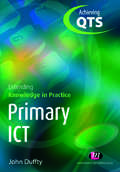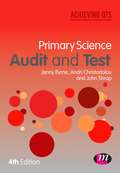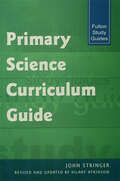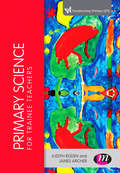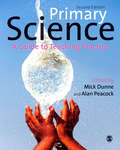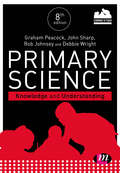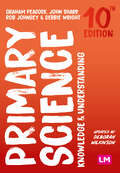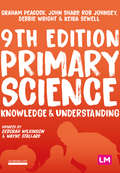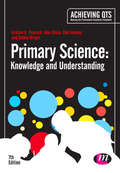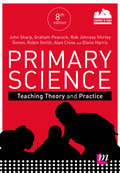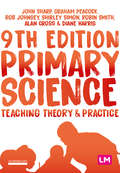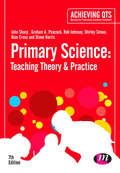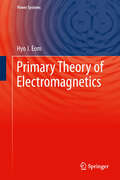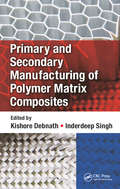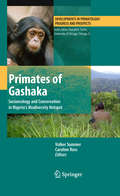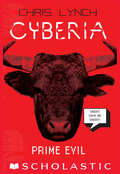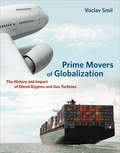- Table View
- List View
Primary ICT Knowledge, Understanding and Practice
by Edward WinklemanThis second edition of a highly successful course book is written specifically to help British trainee primary teachers develop a secure knowledge and understanding of the ways in which ICT supports teaching and learning. It identifies clear links with the new Standards for the award of Qualified Teacher Status, with the National Curriculum, and with the exemplar Scheme of Work for ICT at Key Stages 1 and 2. Each chapter includes links with recent and relevant research as well as directed activities providing a focus for further reading, observation, practice, evaluation and reflection.
Primary ICT: Extending Knowledge In Practice (Achieving QTS Extending Knowledge in Practice LM Series)
by John DufftyStill the biggest concern for many on initial teacher training courses is the acquisition of subject knowledge and the ability to translate that into effective teaching. This book addresses this - building on the core subject knowledge covered in the Achieving QTS series and relating it to classroom practice. It supports trainees in extending and deepening their knowledge of ICT and demonstrating how to apply it to planning and implementing lessons. Practical and up-to-date teaching examples are used to clearly contextualize subject knowledge. A clear focus on classroom practice helps trainees to build confidence and develop their own teaching strategies.
Primary Science
by John Sharp Graham Peacock Rob Johnsey Debbie WrightThis dictionary has been updated with new headwords, now over 650, makingit more comprehensive. Each entry is in alphabetical order and along with aclear and straightforward definition, has a funky colour illustration or diagramto help explain the meaning. Cross references link the user to other usefulwords in this dictionary so it is easy to build up vocabulary quickly. Thecolourful, modern design and artwork make it easy to pick out the word you need,and fully understand it.
Primary Science Audit and Test: Audit And Test (Achieving QTS Series)
by John Sharp Jenny Byrne Andri ChristodoulouIf you are a primary trainee, you must demonstrate a knowledge of science to be recommended for QTS. This popular, widely recommended, text helps you audit your knowledge of science and understand what learning you need to pass your course. A rigorous test helps you identify your strengths and weaknesses and can be revisited at key stages in your course as a tool to monitor and evaluate progress. The fourth edition has been updated in line with the new National Curriculum, includes more information on expanding and developing your knowledge of science and is linked to the 2012 Teachers' Standards.
Primary Science Curriculum Guide
by John StringerThis guide provides trainee teachers with an insight into the nature and teaching of primary science. It aims to introduce you to the ways in which children learn science, and to the science itself. Each Unit can be studied independently or used to support/prepare for school experiences. You will be directed towards additional reading, which will develop or confirm the subject knowledge you will need to achieve QTS. the curriculum guide is up-to-date, revised to take account of Curriculum 2000 and accepted 'good practice' in primary science teaching and learning. It is also flexible - many of the Units are stand-alone. They can be undertaken in any order, at your own pace, to complement school experiences. The Units are practical and feasible: the activities suggested can be undertaken by the non-specialist; in many cases without specialized equipment or access to large numbers of pupils. The guide is comprehensive, covering all the primary science elements in Curriculum 2000 and giving background information into other aspects of primary science teaching. It is also supportive - the guide suggests further texts to support trainees' own understanding of the scientific and pedagogical concepts involved. Additional reading draws on the TTA's list of approved key texts. The original text was piloted by students following a distance-learning PGCE course. It has been revised and updated in line with their comments and to meet Curriculum 2000 and Curriculum Guidance for the Foundation Stage. The text was initially developed as a core text for the part-time distance-learning course at Liverpool Hope and is designed for trainee teachers on distance learning and flexible routes, returning, converting or overseas teachers.
Primary Science Teaching Theory and Practice
by John Sharp Graham Peacock Rob Johnsey Shirley Simon Robin Smith Alan Cross Diane HarrisThe 6th edition of this popular core text provides the essential teaching theory and practice for primary science. It promotes effective teaching through secure pedagogical knowledge, covering the key skills of planning, monitoring and assessment and class management, and relating these specifically to primary science. This 6th edition is linked to the 2012 Teachers' Standards. With full coverage of the theory and practice required for effective and creative science teaching, this text is an essential guide for all trainees working towards QTS. Throughout, practical guidance and features support trainees to translate this learning to the classroom, embed ICT in their lessons and to understand the wider context of their teaching. Trainees will find it helpful to use this book alongside Primary Science Knowledge and Understanding. About the Achieving QTS series All the books in this successful series support trainees through their initial teacher training and guide them in the acquistion of their subject knowledge, understanding and classroom practice. All new titles within the series link to the 2012 Teachers' Standards and take into account recent changes in Initial Teacher Training.
Primary Science for Trainee Teachers
by James Archer Ms Judith RodenWith chapter sequencing following the new Curriculum, this book supports trainee Primary school teachers to make use of the opportunities presented in the new National Curriculum for effective and engaging Science teaching. Covering all of the areas of the new National Curriculum for primary science and offering insight into effective teaching, it helps you connect what you need to teach to how it can be taught. This comprehensive guide to teaching Primary Science will help you secure your subject knowledge, understand how children learn about science and know how to plan and teach effective and inspiring science lessons. Exploring opportunities in the new curriculum for creative and imaginative teaching, it shows you how to capitalize on opportunities to teach Science in a way that sparks children's interest. Includes the full National Curriculum Programme of Study for Science, key stages 1 and 2 as a useful reference for trainee teachers.
Primary Science: A Guide to Teaching Practice
by Alan Peacock Mick DunneWhy is science hard to teach? What types of scientific investigation can you use in the primary classroom? Touching on current curriculum concerns and the wider challenges of developing high-quality science education, this book is an indispensable overview of important areas of teaching every aspiring primary school teacher needs to understand including: the role of science in the curriculum, communication and literacy in science teaching, science outside the classroom, transitional issues and assessment. Key features of this second edition include: • A new chapter on science in the Early Years • A new practical chapter on how to work scientifically • Master’s-level ‘critical reading’ boxes in every chapter linking topics to relevant specialist literature • Expanded coverage of creativity, and link science to numeracy and computing This is essential reading for all students studying primary science on initial teacher education courses, including undergraduate (BEd, BA with QTS), postgraduate (PGCE, School Direct, SCITT), and also NQTs. Mick Dunne is Senior Lecturer in Science Education at Manchester Metropolitan University Alan Peacock is Honorary Research Fellow at the University of Exeter
Primary Science: Knowledge And Understanding (Achieving QTS Series)
by Debbie Wright Keira Sewell Professor John Sharp Mr Graham A Peacock Mr Rob JohnseyNow with online resources to support subject knowledge! Secure subject knowledge and understanding is the foundation of confident, creative and effective teaching. To help your students master this, the 8th edition of this established text now comes with a range of online resources available on the brand new companion website including: a comprehensive science subject knowledge audit reflective self-assessment questions per chapter a science subject knowledge checklist useful weblinks for primary science teaching You can use the science subject knowledge audit to assess your trainees’ progress and ensure they better understand their level of knowledge. Grading students' overall performance, highlighting areas for improvement linked to relevant chapter reading and the ability to share results with their lecturer, makes this the ideal science subject assessment tool. This 8th edition, covering the whole curriculum for primary science, has also been updated to include more on why science matters in primary schools and new content on ‘States of matter’, 'Rocks and soils’ and the 'Theory of Evolution'. New interactive activities are included to engage students in their learning and enable discussion. Using this book in conjunction with the free online resources really makes this the complete package for developing science subject knowledge.
Primary Science: Knowledge and Understanding
by John Sharp Graham Peacock Rob Johnsey Debbie WrightThe 6th edition of this popular core text is the essential subject knowledge book for primary science. Helping trainees to establish and consolidate a secure subject knowledge and understanding of primary science, it promotes the development of confident, creative and effective teachers. This 6th edition is linked to the 2012 Teachers' Standards. Providing full coverage of the required subject knowledge for primary science, this is a core text for primary trainees working towards QTS. Self assessment questions enable reader to understand their own level of knowledge and an M level extension feature in all chapters suggests avenues for further study at Masters level. Research summaries include the latest works in primary science and throughout interactive tasks engage the reader with the text, helping them to link theory and practice. Trainees will find it helpful to use this book alongside Primary Science Teaching Theory and Practice. About the Achieving QTS series All the books in this successful series support trainees through their initial teacher training and guide them in the acquisition of their subject knowledge, understanding and classroom practice. All new titles within the series link to the 2012 Teachers' Standards and take into account recent changes in Initial Teacher Training.
Primary Science: Knowledge and Understanding (Achieving QTS Series)
by John Sharp Rob Johnsey Debbie Wright Graham A PeacockAll the subject knowledge you need to teach primary science. The essential subject knowledge text for primary science. Secure subject knowledge and understanding is the foundation of confident, creative and effective teaching. This comprehensive text, covering the whole primary curriculum, includes interactive tasks, self-assessment questions and links to other resources in all chapters. Primary science matters. This 10th edition includes links to the ITT Core Content Framework and new content on children’s common misconceptions in science.
Primary Science: Knowledge and Understanding (Achieving QTS Series)
by John Sharp Rob Johnsey Debbie Wright Graham A PeacockAll the subject knowledge you need to teach primary science. The essential subject knowledge text for primary science. Secure subject knowledge and understanding is the foundation of confident, creative and effective teaching. This comprehensive text, covering the whole primary curriculum, includes interactive tasks, self-assessment questions and links to other resources in all chapters. Primary science matters. This 10th edition includes links to the ITT Core Content Framework and new content on children’s common misconceptions in science.
Primary Science: Knowledge and Understanding (Achieving QTS Series)
by John Sharp Rob Johnsey Debbie Wright Keira Sewell Graham A PeacockAll the subject knowledge you need to teach primary science. If you are training to be a primary school teacher, you need to understand what you need to know about primary science before you can teach it. To help you build your subject knowledge, this comprehensive text includes subject knowledge from each part of the primary science curriculum and comes with a wide range of resources so you can test you knowledge as you progress through the course. an online science subject knowledge audit with the ability to share results end of chapter self-assessment questions Interactive tasks a science subject knowledge checklist useful weblinks for primary science teaching Recommended further reading This new edition comes with a new chapter on science in curriculum.
Primary Science: Knowledge and Understanding (Achieving QTS Series)
by John Sharp Rob Johnsey Debbie Wright Keira Sewell Graham A PeacockAll the subject knowledge you need to teach primary science. If you are training to be a primary school teacher, you need to understand what you need to know about primary science before you can teach it. To help you build your subject knowledge, this comprehensive text includes subject knowledge from each part of the primary science curriculum and comes with a wide range of resources so you can test you knowledge as you progress through the course. an online science subject knowledge audit with the ability to share results end of chapter self-assessment questions Interactive tasks a science subject knowledge checklist useful weblinks for primary science teaching Recommended further reading This new edition comes with a new chapter on science in curriculum.
Primary Science: Knowledge and Understanding (Sixth Edition)
by John Sharp Rob Johnsey Debbie Wright Graham A. PeacockThe Sixth Edition of this popular core text is the essential subject knowledge book for primary science. Helping trainees to establish and consolidate a secure subject knowledge and understanding of primary science, it promotes the development of confident, creative and effective teachers. This Sixth Edition is linked to the 2012 Teachers' Standards. Providing full coverage of the required subject knowledge for primary science, this is a core text for primary trainees working towards QTS. Self assessment questions enable reader to understand their own level of knowledge and an M level extension feature in all chapters suggests avenues for further study at Masters level. Research summaries include the latest works in primary science and throughout interactive tasks engage the reader with the text, helping them to link theory and practice. Trainees will find it helpful to use this book alongside Primary Science Teaching Theory and Practice. About the Achieving QTS series All the books in this successful series support trainees through their initial teacher training and guide them in the acquisition of their subject knowledge, understanding and classroom practice. All new titles within the series link to the 2012 Teachers' Standards and take into account recent changes in Initial Teacher Training.
Primary Science: Teaching Theory And Practice (Achieving QTS Series)
by Robin Smith Alan Cross Diane Harris Professor John Sharp Mr Graham A Peacock Mr Rob Johnsey Dr Shirley SimonNow with online resources to support teaching practice! An extensive knowledge of the primary science curriculum is not enough for trainee teachers, they need to know how to teach science in the primary classroom. This is the essential teaching theory and practice text for primary science that takes a focused look at the practical aspects of teaching. It covers the important skills of classroom management, planning, monitoring and assessment and relates these specifically to primary science, with new material on assessment without levels. New coverage on being a scientist is included to help readers understand how science teaching goes far beyond the curriculum, whilst practical guidance and features support trainees to translate their learning to the classroom. And to support students even further with the very latest strategies in classroom practice, this 8th edition now includes the following online resources on the brand new companion website: practical lesson ideas for the classroom The Primary National Curriculum for science in Key Stages one and two tips for planning primary science useful weblinks for primary science teaching Using this new edition with the supporting online material makes it an essential guide to effective and creative science teaching.
Primary Science: Teaching Theory and Practice
by John SharpAn essential text for all primary trainees wishing to consolidate and develop their science teaching skills to ensure their classroom practice is creative and effective.
Primary Science: Teaching Theory and Practice (Achieving QTS Series)
by John Sharp Rob Johnsey Shirley Simon Alan Cross Diane Harris Graham A Peacock Robin James SmithAll you need to know about the theory and practice of teaching primary science. If you are training to be a primary school teacher, a knowledge of the primary science curriculum is not enough, you need to know HOW to teach science in primary schools. This is the essential teaching theory and practice text for primary science. It takes a focused look at the practical aspects of teaching and covers the important skills of classroom management, planning, monitoring and assessment, and relates them specifically to primary science. This new edition now includes a new chapter on creative curriculum approaches.
Primary Science: Teaching Theory and Practice (Achieving QTS Series)
by John Sharp Rob Johnsey Shirley Simon Alan Cross Diane Harris Graham A Peacock Robin James SmithAll you need to know about the theory and practice of teaching primary science. If you are training to be a primary school teacher, a knowledge of the primary science curriculum is not enough, you need to know HOW to teach science in primary schools. This is the essential teaching theory and practice text for primary science. It takes a focused look at the practical aspects of teaching and covers the important skills of classroom management, planning, monitoring and assessment, and relates them specifically to primary science. This new edition now includes a new chapter on creative curriculum approaches.
Primary Science: Teaching Theory and Practice (Sixth Edition)
by John Sharp Rob Johnsey Shirley Simon Robin Smith Alan Cross Diane Harris Graham A. PeacockThe Sixth Edition of this popular core text provides the essential teaching theory and practice for primary science. It promotes effective teaching through secure pedagogical knowledge, covering the key skills of planning, monitoring and assessment and class management, and relating these specifically to primary science. This Sixth Edition is linked to the 2012 Teachers' Standards. With full coverage of the theory and practice required for effective and creative science teaching, this text is an essential guide for all trainees working towards QTS. Throughout, practical guidance and features support trainees to translate this learning to the classroom, embed ICT in their lessons and to understand the wider context of their teaching. Trainees will find it helpful to use this book alongside Primary Science Knowledge and Understanding. About the Achieving QTS series All the books in this successful series support trainees through their initial teacher training and guide them in the acquistion of their subject knowledge, understanding and classroom practice. All new titles within the series link to the 2012 Teachers' Standards and take into account recent changes in Initial Teacher Training.
Primary Theory of Electromagnetics
by Hyo J. EomThis is a textbook on electromagnetics for undergraduate students in electrical engineering, information, and communications. The book contents are very compact and brief compared to other commonly known electromagnetic books for undergraduate students. The book emphasizes mathematical aspects of basic electromagnetic theory. The book presents basic electromagnetic theory starting from static fields to time-varying fields. Topics are divided into static electric fields, static magnetic fields, time-varying fields, and electromagnetic waves. The goal of this textbook is to lead students away from memorization, but towards a deeper understanding of formulas that are used in electromagnetic theory. Many formulas commonly used for electromagnetic analysis are mathematically derived from a few empirical laws. Physical interpretations of formulas are de-emphasized. Each important formula is framed to indicate its significance. This book shows a clear and rigorous account of formulas in a consistent manner, thus letting students understand how electromagnetic formulas are related to each other.
Primary and Secondary Manufacturing of Polymer Matrix Composites
by Kishore Debnath Inderdeep SinghThis book offers an insight into the primary and secondary manufacturing of different class of polymer matrix composites (PMCs). The major focus is on the fabrication of a variety of PMCs with substantial coverage of various processing techniques and related advantages and limitations. The book also describes secondary manufacturing processes such as machining and joining of PMCs and provides the know-how related to developing these techniques. It discusses recently commercialized tools and techniques and highlights the opportunities provided by the design and development of newer cutting tools and machining methods. The book covers material selection guidelines, product manufacturability, product development process, and cost-estimating techniques that help readers to understand where a process fits within the overall scheme and which is appropriate for a particular component. This book provides professionals with valuable information related to composites product manufacturing as well as state-of-the-art knowledge in this field.
Primates of Gashaka
by Volker Sommer Caroline RossThe Gashaka Primate Project has grown into one of the largest research and conservation activities in West Africa. At present, it keeps going on the initiative of the editors of this volume and their academic home institutions.The appearance of this volume marks the 10th anniversary of the Gashaka Primate Project
Prime Evil: Prime Evil (Cyberia #3)
by Chris LynchFrom National Book Award nominee Chris Lynch, the third action-and-humor-filled futuristic series about talking pets who are tired of being pets ... and the boy who must help them.Zane and his animal comrades have foiled Dr. Gristle's terrible plots twice--he can't talk to animals, and he can't get at the heart of what makes them wild. Zane can talk to them. He can understand them. He almost is one. Almost. Zane keeps getting in Dr. Gristle's way though - and he's being sent as far out of the way as Gristle can get him. In fact, he's being sent right into the middle of a new plot of the bad doctor's--and in his new, utterly foreign surroundings, he's entirely too human.
Prime Movers of Globalization: The History and Impact of Diesel Engines and Gas Turbines
by Vaclav SmilThe story of how diesel engines and gas turbines, used to power cargo ships and jet airplanes, made today's globally integrated economy possible.The many books on globalization published over the past few years range from claims that the world is flat to an unlikely rehabilitation of Genghis Khan as a pioneer of global commerce. Missing from these accounts is a consideration of the technologies behind the creation of the globalized economy. What makes it possible for us to move billions of tons of raw materials and manufactured goods from continent to continent? Why are we able to fly almost anywhere on the planet within twenty-four hours? In Prime Movers of Globalization, Vaclav Smil offers a history of two key technical developments that have driven globalization: the high-compression non-sparking internal combustion engines invented by Rudolf Diesel in the 1890s and the gas turbines designed by Frank Whittle and Hans-Joachim Pabst von Ohain in the 1930s. The massive diesel engines that power cargo ships and the gas turbines that propel jet engines, Smil argues, are more important to the global economy than any corporate structure or international trade agreement. Smil compares the efficiency and scale of these two technologies to prime movers of the past, including the sail and the steam engine. The lengthy processes of development, commercialization, and diffusion that the diesel engine and the gas turbine went through, he argues, provide perfect examples of gradual technical advances that receive little attention but have resulted in epochal shifts in global affairs and the global economy.

